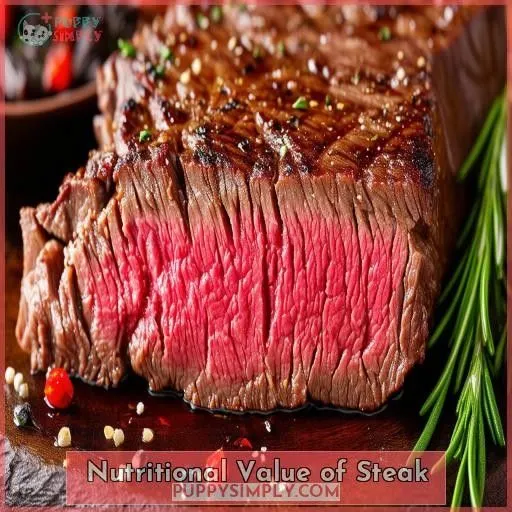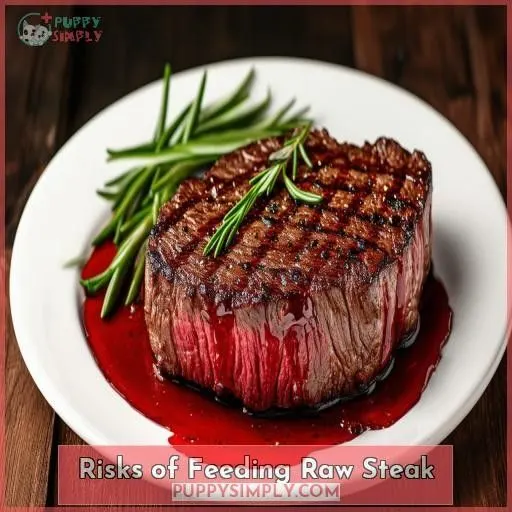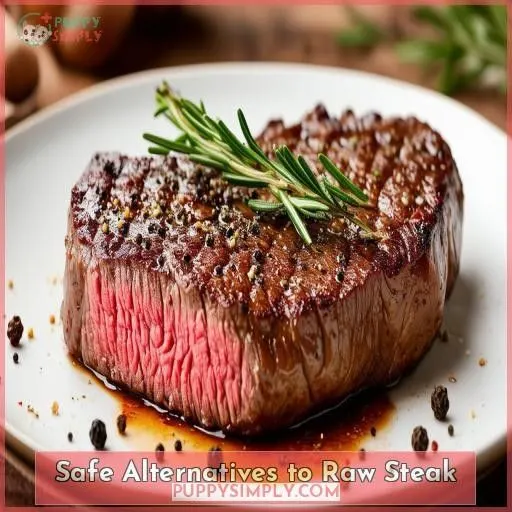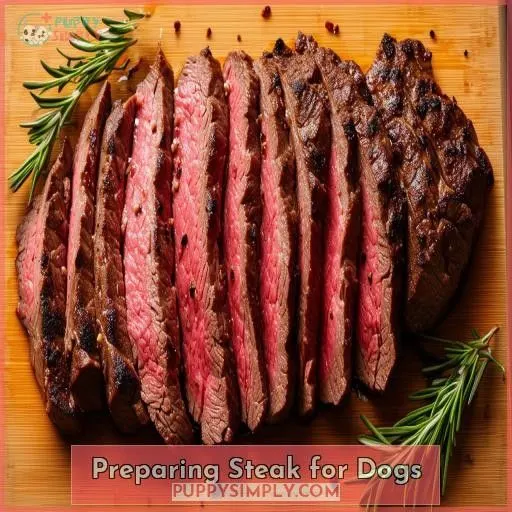This site is supported by our readers. We may earn a commission, at no cost to you, if you purchase through links.
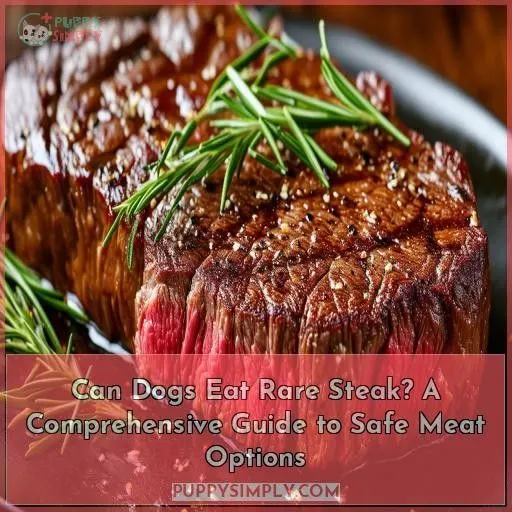
Rare steak poses serious risks like bacterial contamination from salmonella, E. coli, and more, potentially leading to digestive issues, pancreatitis, and even fatal consequences, especially for puppies or senior dogs.
Instead, cook the steak thoroughly and remove excess fat to make sure a safe, protein-rich treat.
If you’re unsure, consult your vet for personalized advice based on your pup’s needs and dietary requirements.
Proper preparation makes all the difference in enjoying a guilt-free indulgence with your beloved canine friend.
Table Of Contents
Key Takeaways
- Feeding Fido that juicy rare steak might seem like a tasty treat, but it’s a recipe for disaster! Those undercooked cuts can harbor nasty bacteria that’ll leave your pup feeling rough.
- Sure, steak packs a protein punch, but the risk of salmonella, E. coli, and other uninvited guests can turn that meaty indulgence into a real doggy downer, leading to everything from tummy troubles to dangerous pancreatitis.
- No need to deprive your furry friend, though! Thoroughly cooked lean cuts, high-quality dog food, and meat-based treats are safer ways to satisfy their carnivorous cravings without putting their health on the chopping block.
- At the end of the day, your vet knows best. They’ll guide you on the right portions and preparations to keep your pup’s tail wagging, whether it’s an occasional steak snack or a balanced diet fit for a canine king (or queen)!
Can Dogs Eat Rare Steak?
No, dogs shouldn’t eat rare steak. Rare steak may contain harmful bacteria that can cause digestive issues or other health problems for dogs.
Nutritional Value of Steak
Steak is a nutrient-dense food that provides dogs with high-quality protein essential for building and repairing muscles, along with beneficial fats, vitamins, and minerals. However, it’s essential to be aware of the potential risks associated with feeding raw or undercooked steak to your canine companion, such as bacterial contamination and digestive issues.
Protein Content
Steak is an excellent source of high-quality protein, containing all the essential amino acids necessary for:
- Muscle development
- Tissue repair
- Enzyme production
- Hormone regulation
This low-fat, protein-rich meat supports your dog’s overall health and aids in recovery from injury or illness. However, moderation is key to prevent obesity.
Fat Content
You’ll want to watch the fat content in steak, as it’s high in saturated fats. Look for leaner cuts with minimal marbling. Trimming excess fat is wise, as too much can lead to obesity and pancreatitis in dogs. Opt for lean proteins and consider substituting fattier meats with lower-fat alternatives.
Vitamins and Minerals
While steak contains protein and fat, it also packs vitamins and minerals that are essential for your pup’s health. However, you need to make sure they’re getting:
- Adequate intake of key nutrients like iron, zinc, and B vitamins
- Balanced dietary requirements met through varied protein sources
- Proper nutrient absorption by avoiding raw, contaminated meat
A veterinarian can guide you on customizing a nutritious, safe diet for your furry friend.
Risks of Feeding Raw Steak
Feeding raw or rare steak to dogs carries significant risks, such as bacterial contamination that can lead to serious digestive issues or pancreatitis. It’s essential to understand these potential dangers before considering raw meat as part of your dog’s diet.
Bacterial Contamination
Feeding raw steak risks exposing your pup to dangerous bacteria like Salmonella, E. coli, Campylobacter, Listeria, and even the parasite Trichinella. These pathogens can lead to severe illness, vomiting, diarrhea, and in extreme cases, death. Consider this grim reality:
| Case | Age | Bacteria | Outcome |
|---|---|---|---|
| Puppy | 3 mo | Salmonella | Deceased |
| Adult | 5 yr | E. coli | Recovered |
| Senior | 12 yr | Campylobacter | Critical |
The risks simply aren’t worth it when safe, cooked alternatives exist.
Digestive Issues
Feeding raw steak to your pup can also lead to digestive issues. Their bodies may not be accustomed to processing raw meat, potentially causing allergies, upset stomach, diarrhea, vomiting, or constipation. It’s best to avoid experimenting with raw diets without consulting your vet first to prevent discomfort and health complications.
Pancreatitis
Feeding raw steak can also increase your dog’s risk of pancreatitis, a painful inflammation of the pancreas. The high fat content in steak can trigger a flare-up, causing the pancreas to release excessive digestive enzymes. Stick to cooked, lean meats to avoid overwhelming your pup’s sensitive digestive system with too much dietary fat.
Safe Alternatives to Raw Steak
While raw steak poses risks, there are safer alternatives for feeding your canine companion. Cooked lean meats, high-quality commercial dog foods, and meat-based treats specifically formulated for dogs provide essential nutrients without the dangers of bacterial contamination or digestive issues.
Cooked Lean Meats
Instead of raw steak, consider cooked lean meats like beef broth, beef jerky (no seasoning), or ground beef. Cooking kills harmful bacteria, but be mindful of portion sizes and remove excess fat. For variety, you could occasionally offer steak tartare (finely minced raw beef) in moderation as a treat.
Commercial Dog Foods
You’ve also got the option of commercial dog foods as a safe alternative to raw steak. These are formulated by experts to provide:
- Complete and balanced nutrition
- Appropriate protein and fat levels
- Essential vitamins and minerals
- Variety in flavors and textures
- Hypoallergenic recipes for sensitive pups
High-quality brands use human-grade ingredients, so your furry friend stays healthy and happy.
Suitable Meat-Based Treats
If you’re looking for safe meat-based treats, consider freeze-dried or dehydrated meat options. Unseasoned beef liver and low-fat lunch meats can also be occasional treats. Pork rinds provide a crunchy, protein-rich alternative. Always introduce new treats gradually and in moderation to prevent digestive issues.
Consulting a Veterinarian
It’s essential to consult your veterinarian before introducing rare or raw steak into your dog’s diet, as they can assess your pet’s specific age, health, and dietary needs. Your vet will also guide you on appropriate portion sizes, ensuring your furry friend receives the right nutritional balance without consuming excessive amounts of fat or protein.
Pet’s Age and Health
Before considering raw steak, consult your vet about your pup’s age and overall health. Puppies, seniors, and dogs with allergies, pancreatitis, or weakened immune systems may face increased risks. Older dogs can struggle with raw meat due to dental issues or nutrient absorption challenges. Growing pups need balanced diets to support developing growth plates.
Dietary Needs
When consulting with your vet, discuss your dog’s dietary needs thoroughly. Different breeds and ages have varying nutritional requirements. Also, mention any allergies or dental issues, as these impact suitable food choices. Maintaining your pup’s ideal weight range is essential for overall health – your vet can advise on proper portion sizes.
Portion Control
Consulting your vet is essential for proper portion control. They’ll assess your dog’s calorie intake, ideal portion size, and weight management needs. Overfeeding steak can lead to obesity, pancreatitis, and other issues. Your vet will guide you on the appropriate amount that provides health benefits without dental or digestive problems.
Preparing Steak for Dogs
If you decide to feed your dog steak, it’s imperative to cook it thoroughly to eliminate the risk of bacterial contamination. Removing any bones and trimming excess fat will also help prevent digestive issues and pancreatitis, while adding appropriate dog-friendly supplements can enhance the nutritional value of the meal.
Cooking Methods
If you decide to feed your dog steak, cook it thoroughly to guarantee food safety. Slow cooking methods like baking or simmering help achieve the right texture and eliminate harmful bacteria. Avoid seasoning with ingredients toxic to dogs. For older pups, cooking low and slow or lightly dehydrating the meat can make chewing easier.
Removing Bones and Fat
You’ll want to carefully trim off any excess fat or sinew from the steak before feeding it to your pup.
Closely examine for any small bone fragments that could pose a choking hazard.
It’s best to avoid steaks with heavy marbling, as the fat content can be too rich for dogs.
Proper storage is key – keep trimmed steak refrigerated until serving time.
Adding Supplements
While preparing steak for your pup, consider adding supplements for a balanced diet. A multivitamin provides essential nutrients, while calcium sources like crushed eggshells promote bone health. Digestive aids and immune boosters can also be beneficial. For homemade treats, mix cooked steak with vitamin-rich ingredients like pumpkin or yogurt.
Frequently Asked Questions (FAQs)
How much steak can dogs eat safely?
Let’s explore portion control for Fido’s steak cravings. While an occasional small bite is typically safe, too much rich meat can upset sensitive doggy tummies. A few thin slices per 20 lbs of body weight is a reasonable guideline for this indulgent treat.
Are certain dog breeds more prone to issues?
Certain dog breeds are more prone to digestive issues if they consume raw meat like rare steak. For example, dogs with sensitive stomachs or breed-specific dietary restrictions may experience adverse effects. It’s wise to consult your veterinarian before introducing new foods.
At what age can puppies eat steak?
You should wait until puppies are around 6-8 months old before introducing steak or other tough meats. Their digestive systems need time to fully develop to handle rich, chewy proteins safely. Start with small amounts and closely monitor for any adverse reactions.
Can steak be mixed with other foods?
Yes, you can mix steak with other foods for a balanced diet. Add vegetables, grains, or lean proteins to create a nutritious meal for your pup.
Are cooked bones from steak safe for dogs?
While cooked steak bones are tempting treats, they pose serious health risks for dogs. The sharp edges can splinter and cause obstructions or punctures in your pup’s digestive tract. It’s safer to skip bone-based snacks and stick with dog-approved chews instead.
Conclusion
According to a recent survey, nearly 30% of dog owners admit to occasionally feeding their pets table scraps, including raw or undercooked meat.
However, can dogs eat rare steak safely? The answer is a resounding no.
Thoroughly cooking and defatting steak eliminates harmful bacteria and reduces pancreatitis risks, making it a protein-packed, occasional treat for your furry friend.
Consulting your vet establishes proper portions based on your dog’s specific dietary needs.

